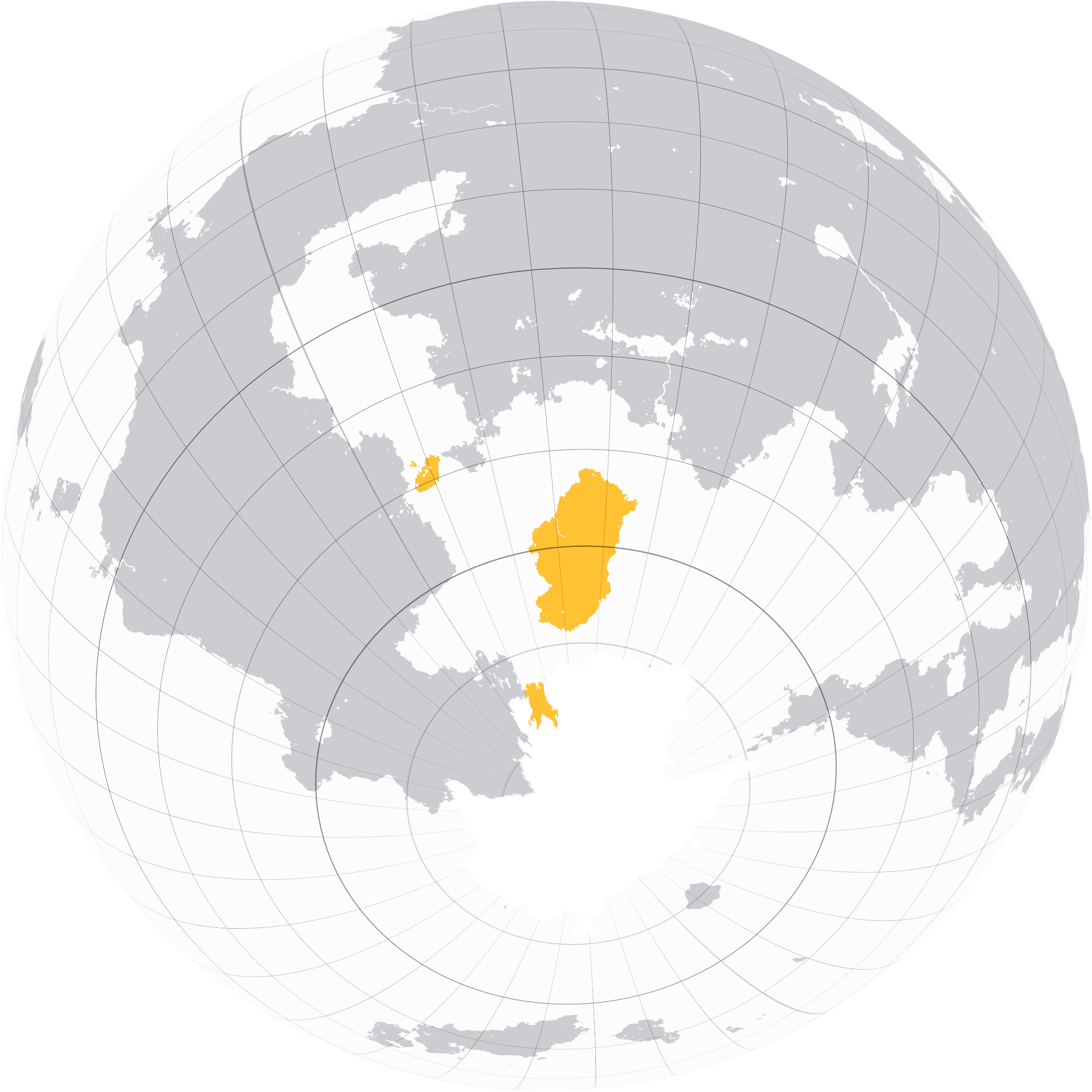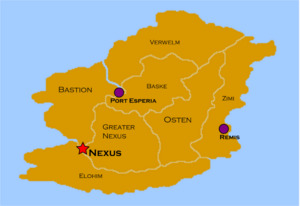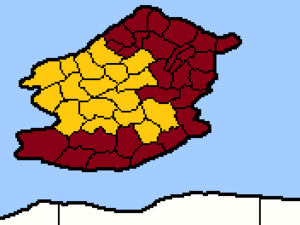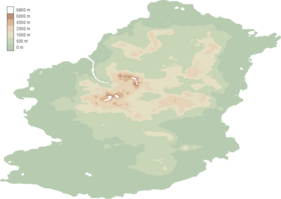Ikonia: Difference between revisions
No edit summary |
No edit summary |
||
| Line 12: | Line 12: | ||
| denonym = Ikonic |
| denonym = Ikonic |
||
| languages = Highkonic |
| languages = Highkonic |
||
| − | | currency = [[Currency|Benos]] |
+ | | currency = [[Currency#Benos|Benos]] |
| capital = Verwelm |
| capital = Verwelm |
||
| government = Federal Republic |
| government = Federal Republic |
||
Revision as of 15:28, 25 January 2024
|
Ikonic Federation
I𐤊𐤏𐤍𐤉𐤂 f𐤄𐤃𐤄𐤓𐤀𐤕𐤉𐤏𐤍
|
|||||
|---|---|---|---|---|---|
 |
|||||
| Flag of the Ikonic Federation, Impellent pattern, adopted 2199. | |||||
| Motto | "Tempus, officium sapientiae" (Time, progenitor of wisdom) |
||||
| Common Name | Ikonia | ||||
| Anthem | "A Future for the Past" | ||||
 |
|||||
| Ikonic territories, 2200. | |||||
| Demonym | Ikonic | ||||
| Official languages | Highkonic | ||||
| Currency | Benos | ||||
| Politics | |||||
| Capital | Verwelm | ||||
| Government | Federal Republic | ||||
| Foundation | 2101 (Spearkan Cessation) 2113 (Inceptus Ikonicus) 2118 (Ikonic Government Installed) |
||||
| Apex | Milo Mazdok | ||||
| Preceded by | Spearka | ||||
| Demography | |||||
| Ethnicities | Spearkan 76.7% Felisk 9.4% Troak 6.5 Laythi 6.1% Other 1.3% |
||||
| Population | 9,490,084 | ||||
| Area | 17,756 km² | ||||
Not to be confused with Iconia.
Ikonia, officially the Ikonic Federation, and sometimes referred to as New Spearka, is a country in Baskay-Caledon. The country is an island with an area of 14,993 km² and a mainland population of over 4.74 million. The coastal areas, mountains and lowlands are largely urbanized, though much of the island remains undeveloped. It is connected to the continent by the Syndetil-Owlia Bridge. The capital city is Verwelm, situated on the northern coast. Overseas territories include West Hook Island and Fish Island (disputed). The Ikonic Federation is distinguished by it's highly unusual and unique method of governance. Large areas of the island of Ikonia are dedicated to the sustainment of enormous arcological domes, known officially as Omnichronicratic Containment Hemispheres (OCH), but more commonly referred to as cantons. These cantons contain populations of kerbals who are forced unwittingly to live as historical societies, which is then observed by the cognizant population to inform their political decision-making. Though the ethics of such a system are highly dubious, opposition to the Omnichronicratic program is small, as Ikonic census data reports high scores in the Kerbal Happiness Index (KHI) across all six states.
The citizens of each state obsess feverishly over the idiosyncrasies of their respective time period, with levels of engagement in Rancosian philosophy varying from a humble adherence to veritable hysteria. Urban quarters and popular congregations across the nation are a riot of color and culturally significant items, and each state's architecture is similarly evocative. It is not uncommon to see modern citizens commuting to work in suits of medieval armor, or carving ritualistic scrimshaw symbols into office supplies. In fact, such practices would be lauded as edifying and morally upstanding.
Much like its predecessor, Ikonia maintains a relatively isolationist foreign policy, engaging little in the affairs of other nations. Despite this, trade and tourism is actively encouraged by Ikonic authorities, and the federation maintains a large fleet of merchant vessels that account for a significant portion of trade within Baskay and Baskay-Caledon.
It is estimated that roughly 570,000 people live within OCH's, roughly 6% of Ikonia's population. True numbers are difficult to determine, as many of the Impetum Sphaera's inhabitants live in squalid conditions that inhibit accurate census data. Furthermore, the exact number of inhabitants within the Honua Kahiko is unknown due to their reclusive and highly mobile lifestyle. Monastic scholars from Valora and Oltum place their populations at around 250,000 and 10,000 respectively.
Etymology
Usually applied only to the Ikonic mainland, the name Ikonia comes from the old Spearkan Ikon, meaning a visual representation of an object, scene or abstraction. During the reformation of the nation, this was deemed as an appropriate sobriquet, as the cantons represented an idealized image of historical life. The adjective "Ikonic" is commonly used to refer to matters relating to the Ikonic Federation as a whole, and is used in law to refer to citizenship and nationality.
Whilst the name Spearka is no longer officially recognized, many citizens still use the moniker to refer to the island as a whole, or to elements of cultural history. Occasionally, "Spearka" is still used erroneously by foreign powers and individuals.
In 2113, a campaign was launched to reinforce the nations new official title. Local councils across Nexus distributed flyers and aired television segments that encouraged people to embrace the new name, using the now infamous slogan "Don't be moronic, go Ikonic!". The campaign received enormous backlash and was a political disaster for the Lumian Prime, Isidore Wexel, who had masterminded the effort, and he was swiftly excommunicated from his monastery. The slogan was criticized by traditionalist groups for being culturally insensitive and demeaning of traditional Spearkan values. However, the campaign succeeding in raising awareness for the new title and cementing its legality.
History
| “ | - To procure utmost sagacity, one must gather wisdom from every realm. And verily, the pearls of wisdom from bygone times must be treasured and preserved, lest they be lost to oblivion. | ” |
| —Kerdavor Rancos, 97 AD | ||
In the waning days of the 21st century and shortly before the interstellar exodus, a portion of the Spearkan population denounced the starward journey and chose to remain on Kerbin. After almost two centuries of political turmoil, social change and ideological reshuffling, the Spearkan identity had been eroded and then subsequently reformed into a new national oneness. By 2101, public acrimony toward traditional Spearkan politics had grown, as Rancosian extremists seeded resentment towards those that had left the nation behind during the great exodus. Civil unrest and numerous petitions lead to the Zimian Apex, Olgar Brown, resigning from her position, and the greater council renouncing Spearka as an extant country. This period became known as the 'Spearkan Cessation'.
In 2113 the greater council had reached a consensus on the future of the nation, adopting the moniker 'Ikonia', as well as outlining the Omnichronicratic design. Spearkan state buildings were torn down, populations were relocated to make way for towering megastructures, and new curriculums were published in educational facilities. The legendary Arcarosian prime and staunch proponent of Rancosian theory, Salie Oliton, was appointed as the first Apex of the Ikonic Federation. Her term as leader was fraught with challenges and became the subject of much criticism, though historians now agree that her tractable temperament and visionary rhetoric were necessary to carry Ikonia from one age into the next without bloodshed. This period came to be marked as the 'Inceptus Ikonicus'.
By 2118, these transformations had culminated in the official birth of the Ikonic Federation.
Spearkan Period
The Spearkan Federation was officially founded in 2047 during the expansion era. In the century prior, Baskay endured a tumultuous history, being both the starting point and subject for the great empires of Kerbin, with its strategic location being invaluable for trade and assertion of power. However, the great turning point for Baskay's history began in the final years of the Bakasian Empire. During its prime the Empire occupied modern-day Basil, Behin, Laythia, the KSKM and Owlia, however as its influence grew the Emperor increased efforts to centralise power from the capital, now modern-day Esperia. After being embroiled in a multitude of wars with lesser powers, the people of the Baskay Bay grew agitated, and in defiance laid a massive blockade of the island preventing food and supplies from entering the capital. Rebellion was rife as Imperial forces continually tried and failed to break the blockade, and as the Bakasian cities starved they finally collapsed. The last Bakasian Emperor shattered the ancient Baskay crown that had been passed from generation to generation. The Bay was finally free, and chose to give power to the working classes either in the form of Communism, like the KSKM, Syndicalism, like Laythia or Democracy like Owlia.
Spearkan Civil War
Baskay itself plunged into chaos, the famine cut the entire population of the island by a third, meaning the island went through a revolving door of different regimes. But eventually, after a century of strife the Spearkan Federation began when a committee of scholars came together to unite the Island under a new capital. The Spearkans persevered for years, watching nations around Kerbin come and go, looking to seek glory from within rather than without, attempting to tap the knowledge of the universe. This zeal for introspective discovery even entered into the political discourse, and the incentive to seek knowledge became decreasingly negotiable. A nobility of intellectuals emerged, and uneducated individuals were prevented from holding positions of power. Only until the mid 21st century was this repealed, when, motivated by the style of regimes around them, full-scale rebellion emerged again in an effort to overthrow the Greater Council in favour of a socialist regime that sought to "protect" minorities. They named their new nation "Zeyarn" after the old name for Nexus in the days of the Bakasian Empire; civil war continued until 2051 after the last of the rebel forces were ousted in the Battle of Verwelm fortress, and forced into exile to a separate entity bordering Aquaria, which would then dissolve and be disseminated into elements of Zeoul. Spearka emerged from the civil war with an even greater notion of purpose, and a deeper appreciation of peaceful ventures. With the civil war finished, the wartime economy was finally lifted in favor of a standard peacetime policy. Exports and trade flourished as the island rebuilt, and civilians could once again continue their academic ventures.
Rebuilding of the Nation
During this period of economic and political revival the serving Apex, Theoburry Axin, concluded his term. The bearer of Osten, Corfid Conston of the Green Party, proved to be very popular candidate in the subsequent general election, being the youngest member of the Greater Council. He had demonstrated his political aptitude during the "Red Heist", when communist sympathisers attempted to rob a local bank to fund a second resistance movement; Conston successfully defused the situation without bloodshed. He spoke often of his desire to further improve Spearkan research prowess and make it a golden jewel of Kerbin, rallying many traditional Spearkan fundamentalists and garnering a loyal following. He was elected to serve as Apex in 2059, and his initiation ceremony was watched by almost the entire population of Spearka. Conston represented a revitalized and traditional future for the federation, and the Spearkan people were relieved to have a leader that they believed would steer them away from conflict, and back towards the Spearkan tradition of scientific enquiry. Early in his leadership, Conston ratified the Outer Moon Initiative which sought to establish a permanent colony on Minmus. Conston was re-elected in 2064. The completion of the space station 'Nivix' in 2068 marked a glorious return for the Spearkan people, and established a modern age in which the horrors of the civil war were firmly in the past. Conston showed himself to be an isolationist throughout his two terms as Apex; his reconstruction initiatives put the Federation back on the map and his "citizen empowerment" programme had proven popular among the citizens, bolstering quality of life and education rate. However, particularly in his second term his diplomatic capability was put into question with the Zokesian occupation of Fish Island, here he sought a peaceful solution despite hostile intent. This sheer inability to see an act of war proved highly unpopular, and citizens began questioning if Conston could protect the Federation's sovereignty.
By the time of third Apex election public opinion had shifted significantly from the romantic notions of a heralded golden age. The occupation of Fish Island by Zokesian forces had severely shaken the nation's confidence in Conston, and an armed conflict so close to Spearka had reawakened haunting memories of war on the mainland. The largest protest since the civil war occured following the lack of a military response of the Zokesian occupation of Soltem in spite of the diplomatic objection issued by the government, the Greater Council stated at the time that the nation was not yet ready for war and to do so would prove absolutely disastrous. Even after the occupation was relieved by Aquarian forces, massive outcries to significantly bolster the Spearkan military, particularly in the naval and air department, as well as a mass fortification of the island to serve as a barrier between the east and the homeland, were parroted by many political figureheads and media outlets.
The Spearkan people began to demand an end to their isolationist policies, lest the sovereignty of the nation be threatened. In 2072, Herster Joxton of the Liberal Party was elected into Apexship. The anti-isolationist Joxton was a renowned innovator responisble for many new technologies, and had recently risen to become Mayor of Nexus. He sought to further press the concept of a Pan-Baskay Alliance between the Spearkan Federation, Owlia and Aquaria. The prospective expansion of the two neighbouring states’ special relationship into a three-way coalition was hampered for years by internal discourse and bureaucracy. Joxton’s new foreign policy was tested barely a few months after following the Basilian occupation of Troakia in an attempt to assert its control over the Lesser Bay. The Greater Council made an official objection to the occupation, asserting that it is a flagrant violation of the freedoms of Troakian citizens and a display of imperialism; this objection was further supported by the nations of Valsang and New Grestin. When the nation of Basil refused an official ultimatum to pull their forces, The Greater Council declared war on the nation, beginning the Minor Baskay War.
Despite diplomatic support to the cause, other nations refused the Joston's call to arms, with only distant Zimor accepting its call. Regardless, the Spearkan Military pushed for an invasion of Basil Proper, which began in the Battle of South Yarva. However, due to Basils existing diplomatic connections due to its membership of the Tau Coalition, they were quick to retaliate in Operation Kickback, this single, devastating strike eliminated not only the invasion force, but also destroyed vehicle garrisons stationed in Bastion and Verwelm through their superior numbers. Despite the coalitions upper hand, they made no attempt at launching a ground invasion of the island and, after a year of political stalling, the Great Council offered a peace, abandoning the Troakians to their fate. In ollowing the signing the treaty that has put an end to the Minor Baskay war, Herster Joxton made a brief announcement that he was to step down and resign as Apex. Nationwide riots broke out and the Greater Council was accused of cowardice. Unrest was particularly fervent in Bastion and Baske, where the greatest number of families had been affected by the loss of their fathers and sons in the war.
The Redemption Project
Following the end of the Minor Baskay War in 2074 Apex Joxton had abdicated his position, citing that his provocation of the Tau Coalition and military mismanagement had lost the war and, by extension, the nations entire relevance on the world stage. A snap election had to be called to elect a new Apex to replace him. The various Bearers had various plans of action on how to put the Federation back on the map ranging from further pushing for the Pan-Baskay Alliance to a revanchist war but a recent movement, now personified in the Salvation Party pitched an novel, ambitious and extremely daunting task; to evacuate most, if not all of the population to a new, Kerbin-like world and rebuild their nation there.
While the Salvation Party lost the election the new Apex of the Green Party, Meglong Mirk, saw the potential for this project and offered a unique position of co-apex to the Salvation Party's representative, Gus Leban. He outlined the groundwork for a full-scale spaceborne project detailed "The Redemption Project". In 2072, the Spearkan Minmus observatory had identified a habitable exoplanet orbiting an orange dwarf star 43 light years away. The planet was subsequently named "Selenya" after a mythical paradise from Spearkan folklore. Selenya was selected as the destination for Spearka's future.
The project called for the construction of a massive space fleet, nicknamed, "Odyssey", consisting of dozens of stasis ships containing a Spearkan populace. These stasis ships would be divided into seven subunits each led by a Generation ship, constructed from a hollowed out asteroid to serve maintenance, research and tactical roles as well as representing their respective branches of government throughout the 86-year trip.
For Nine years the nation fell silent, no further delegations were sent to any political conferences, no addresses were sent to any other nations in response to any particular event and any attempts from other nations, even ones previously friendly to the Federation to ascertain any information on what had happened to the Spearkan nation or the technologies they were using for the project failed completely.
In 2083 the Kerbin system roared to life, exhaust plumes from the countless numbers of stasis ships filled the sky as a video communique from Apex Mirk sent out one final speech from his Generation ship, warning other world leaders not to attempt a landing on their destination planet and urging any Spearkan citizens remaining on Kerbin, to emigrate to nations previously friendly to the Federation. This event marked the official end of the Spearkan Federation on Kerbin.
Spearkan Cessation
The island's remaining inhabitants, along with immigrants seeking new opportunities would form a new government mere months later under the Imperii Egros. Despite Apex Mirk's final message, Spearkan culture and identity refused to die out entirely, and a portion of the remaining populace retained their Spearkan identity. A shadow of the federation would emerge from the rift created by the Redemption Project, slowly growing over time and developing into an officially sovereign nation once again. The territory of Fish Island, nominally still a part of the Federation, would elect to become a protectorate of Aquaria.
Inceptus Ikonicus
Geography
Climate
The vast majority of Ikonia's territory is situated in Baskay-Caledon. Ikonic overseas territories extends to the two islands, Ulkam and Yarva, a region of the Antarctic, and Fish Island.
Mainland Ikonia has a temperate to frigid climate, being situated between 52°S and 69°S of latitude. Annual mean temperatures vary from 4 °C (39.2 °F) in the south to 8 °C (46.4 °F) in the north. The verdant island is largely covered in grasses and common varieties of pine, with only a small number of endemic plant species. The Eastern coast of Ikonia is battered by powerful prevailing winds throughout the year, which are utilized in wind power generation systems along across the country. Conditions vary sharply further inland. The inner regions along the north and north-east are dry and temperate, with annual mean temperatures of 10 °C (50 °F). The central mountain range has a peak elevation of over 6,500m. The foothills and plains to the south are dry and cool, sustaining large forests of pine. The island has an area of 16,758km².
Weather
Ikonia is host to an abnormally varied range of weather phenomena. For reasons that are still unknown to science, the island sees frequent rainstorms, snowstorms, thunderstorms, hailstorms, tsunamis, lightning, derecho wind storms, cases of mass hysteria, ball lightning, anticyclonic typhoons, hurricanes, tornadoes, sandstorms, whirlpools, incidents of raining fish, flash floods, firestorms, and a semi-sentient cumulonimbus cloud suffering from insular dwarfism that orbited the island dropping condensed bombs of hyper-hail that lasted for two months.
Meteorologists remain baffled by these events. The IFGS (Ikonic Federation Geographic Society) have officially theorized that these freak incidents may be a product of the massively altered weather systems within each state due to the enormous size of the canton megastructures.
2125 Storm
On March 18 2125 at 3:08 p.m. in the skies above the northeastern coast of Nexus, a warm front collided with a cool air pocket situated over the Ikonic mainland, generating a squall line of cumulonimbus thunderheads that marched south towards the island. Atmospheric pressures in the surface low-pressure area recorded by the IFGS dropped to 1,003 hPa as the warm front punched through the core of the main squall, dissipating the majority of the thunderheads. However, by 5:15 p.m. the IFGS recorded an increase in meteorological activity centering around on the single remaining cumulonimbus cloud. By 5:41 p.m. the single storm cloud had intensified enormously as it fed upon the latent atmospheric energy of its dissipated brothers, though its physical size remained diminutive. At this point the cloud had grown to a height of only 3,100m (10,170 ft), but with internal updrafts exceeding 260 kph (161 mph).
At 5:58 p.m. the microscale storm made landfall. Central surface pressure beneath the storm lowered to 928 hPa. A thick curtain of hail pummeled the areas beneath the storm in a wet microburst, causing significant damage to properties and vehicles in the town of Sankrator. Bolts of lightning projected from beneath the base of the storm with an unusually high frequency, striking the masts of ships docked around the port of Sankrator. This started oil fires within the bay which inhibited rescue efforts for the crews of the vessels perforated by hail. By 6:20 p.m. the storm moved on from Sankrator and headed further inland. In its wake, 74% of properties within the area had been damaged or destroyed, and 37 of the town's 538 residents had perished.
States
Like its predecessor, Ikonia is divided into semi-autonomous states, though Ikonia is comprised of six rather than seven: Nexus, Oltum, Arcaros, Valora, Lumia and Advan. The former seventh state, Bastion, was turned into the Bastion Proving Grounds and is now the heart of Ikonic industry.
Nexus
Nexus is both the foremost state of Ikonia and the heart of it's political power. It was the seat of power in Old Spearka. Its austere and cosmopolitan nature meant it was the perfect setting for the calculated leadership of Ikonia. The basic leadership structure of Spearka has been maintained, and the capital state has retained it's original name. Having no omnichronicratic megastructure-microculture of its own, Nexus has no monasteries, Primes or Bearer. Instead, it is the responsibility of Nexus to elect the Apex from the Bearers of the other five Cantons.
Oltum
Originally known as Osten. It's great green plains and unspoiled natural environment made it the ideal location for a hunter-gatherer society. The Prehistoric canton represents a time before recorded history, where decision-making would be guided by survival instincts, communal living, and a close connection with nature. While this canton offers a different perspective on decision-making, the absence of complex societal structures and limited scientific knowledge significantly limits the range of views held by the population. The Oltumese canton is known as The Honua Kahiko. The current bearer is Spear That Strikes The Moon.
Arcaros
Originally known as Verwelm. The tranquil beauty and mild lifestyle of the region made it the perfect home for philosophers and artists, who would rather discuss issues at length than actually act upon them. The Classical period was known for its advancements in philosophy, democracy, and the arts. Citizens of this canton might value rational thinking, debate, and civic engagement. They make decisions based on a deep understanding of ethical principles and political systems. The Arcaros canton is known as The Octum Tholos. The current bearer is Elenor Sorelus.
Valora
The Agricultural origins of Elohim gave way to the feudal and martial society of Valora, where the fertile pastures and plentiful shores are toiled. Rarely, a vessel of exploration ventures into the deep waters and across the horizon.The Medieval period was characterized by feudal systems, chivalry, and religious influence. The decision-making in this canton is influenced by hierarchical structures, moral codes, and religious doctrines. However, the limitations on education and scientific progress during this period affect the range of available knowledge. The Valoran canton is known as The Impetum Sphaera. The current bearer is Lionel Rothstrum.
Lumia
The bejeweled mountains and high altitude observatories of Baske gave rise to the illumination and optimism of Lumia. The Renaissance period witnessed a revival of learning, exploration, and artistic expression. Citizens of this canton might have a thirst for knowledge and a curiosity about the world. Decision-making could be influenced by intellectual inquiry, critical thinking, and a desire to advance scientific and cultural understanding. The revered inventor [ ] has constructed a number of primitive hydroelectric dams across Lumia, meaning the countryside hills ripple with the reflected light of waterfalls and canvas. The Lumian canton is known as The Lumia Rotunda. The current bearer is Gabrieli Azmund.
Advan
Originally known as Zimi. The eastern coastline is hammered by strong prevailing winds. Swathes of wind turbine farms line the cliffs like giant, stalwart defenders. This provides a limitless source of energy for the innovative and economical society of Advan, allowing their technologies and ideas to flourish without a reliance on fossil fuels. The Industrial period brought about significant technological advancements, urbanization, and industrialization. Citizens in this canton might prioritize efficiency, innovation, and economic development in their decision-making. However, they might also face challenges related to environmental and social consequences of rapid industrial growth. Nuclear power plants in the old Nexus have led to a higher rate of mutation in Advan, ensuring that the population never advances. The Advanian canton is known as The Fabrikglobus. The current bearer is Muustoff Simmons.
Bastion Proving Grounds
Bastion was once the centre of the Federations military, focusing on the production of weapons and military technologies. Great shipyards lined the Baske and Elohim rivers, and the eastern region of the state was also home to three launchpads intended for launch of ground-to-space missiles or military spacecraft. During the reformation, Bastion was depopulated, and the entire state was reconsecrated to heavy industry, as well as test sites for both civil and military technologies. The region is officially referred to as the Bastion Proving Grounds, more commonly pronounced as 'Bazprog'. Virtually all of Ikonia's automobiles, military equipment, aircraft and weapons are tested at Bazprog. In addition to test sites, Bazprog is also exploited for its rich deposits of ore and precious metals, making it the center of virtually all Ikonic heavy industry. Miles of canals, mineshafts and maglev tracks criss-cross the landscape, extending even beyond the sea in the form of off-shore platforms and undersea pipelines.
Omnichronicratic Program
In the closing years of the 21st century, Spearka underwent a radical and, to some, hideous reform. The populations of each state were evacuated into large holding areas deep underneath their respective countryland. Their possessions, social standing and familial bonds were broken down and forged into the framework of a new system of governance. Omnichronicracy.
It was remembered that in the old days, the preeminent scholar and statesman, Kerdavor Rancos, had proposed a way to preserve the knowledge of the ages. As generations are incepted and expire, their knowledge can be disseminated through technology, but their wisdom is lost forever. Rancos believed that it was this generational wisdom, this essence of each individual experience, that was the key to supreme governance and advancement of the Kerbal condition. And, he had a solution. Cantons. Enourmous districts of land dedicated entirely to the sustainment and preservation of a sample society from each historical epoch. By this method, the customs and societal subtleties of every era would not be lost, but would instead be maintained as a compendium of Kerbal experiences, from which one could inform the decisions of the present, and the future.
These cantons would be populated, unwittingly, by a fortunate (or unfortunate) minority of citizens from each state. Their entire lives would be planned, cultivated and monitored by the cognizant majority on the outside world, who would attend to the teachings of their preserved ancestral ways, in whatever form that may be manifest. From the most mundane domestic chores, to the piety of their beliefs, to the ferocity and aggression of their wars. Direct contact with the inhabitants could be made only through subconscious suggestion that would be interpreted as allegories, myths and visions. These stimuli are known as Psychological, Subliminal and Latent Messages (PSALM's).
Rancos, was not a popular man. Despite his genius, he was ostracized by his peers and reviled by those working under him. His roots as a peasant farmer from Osten made him the butt of jokes, and after a litany of other failed proposals, he was eventually executed for his visionary ideals. Such a monumental societal and technical undertaking had been deemed as utterly ludicrous by those Rancos had tried to convince, and his ravings about Omnichronicracy were dismissed on all accounts as hysteria, and lunacy. It took nearly 2,000 years for his genius to be recognized. The enlightenment and freedom of thought found in modern society has allowed for his ideas to be embraced at last. By the 22nd century, the technology now existed to realize his dream, and the construction of the five historical cantons could commence. Six titanic domes. Hemispheres of technology and high society that would allow Spearka to peer into the past itself.
Outcomes
Criticisms
Although the Omnichronicratic program is widely popular, concerns over the ethics and reliability of the system are often raised. Scholars in the University of Verwelm have pointed out that the cantons can never provide a truly accurate view of the past, as they are constructed and maintained by modern kerbals who are inevitably bias towards a version of history that most expediently conforms to their preferred narrative, be it subconscious or cognizant.
The monastery of the Spearkan Zelorites in is devoted to the opposition and dismantlement of the Omnichronicratic program. They revile all Rancosian beliefs and campaign relentlessly for a return to the ways of Old Spearka. The Spearkan Zelorites have attempted to directly sabotage the program on a number of occasions. In 2191, they were successful in infiltrating the Impetum Sphaera and abducting an inhabitant whom they later attempted to reintegrate into modern society. They took the abductee, a 16 year old squire, to their monastery and began to show him various examples of modern technology. Before the authorities could arrive, the abductee had rejected the Zelorites' attempted ingratiation and instead slaughtered them with his sword, proclaiming them to be demonic visitations. When OCHVa personnel arrived at the scene, all seven of the Zelorites were found in various states of dismemberment, with the abductee prostrating himself before a television screen displaying the face of Apex Flammion d'Ambray.
Politics
Government
| No. | Portrait | Name
(Birth–Death) |
Term | Length of Office | Notes | State | Party / Monastery | |
|---|---|---|---|---|---|---|---|---|
| 1 | Theoburry Axin
(1987–2083) |
April 30th, 2047
– August 7th, 2053 |
6 years, 99 days | The first Apex of the Spearkan Federation. | Bastion | O | National Party | |
| 2 | Corfid Conston
(2027–2083) |
August 7th, 2053
– August 8th, 2072 |
19 years, 1 day | The youngest Apex ever to be elected, aged 26 years when initiated. Also the longest term. | Osten | O | Green Party | |
| 3 | Herster Joxton
(2018–2094) |
August 8th, 2072
– May 19th, 2074 |
1 year, 284 days | Resigned following the peaceful resolution of the Minor Baskay War. | Nexus | O | Liberal Party | |
| 4 | Meglong Mirk
(2033–2083) |
June 1st, 2074
– July 20th, 2083 |
9 years, 49 days | The first female Apex. Despite winning the election, she offered a coalition government to Gus Leban, forming the only joint Apexcellency in Spearka's history. | Elohim | O | Green Party | |
| Gus Leban
(2035–2083) |
Masterminded and ratified the Redemption Project, heralding the decline of the Spearkan Federation. | Osten | O | Salvation Party | ||||
| Great Exodus | ||||||||
| 5 | Emanthos Cule
(2012–2096) |
September 3rd, 2083
– October 14th, 2088 |
5 years, 41 days | Never officially elected, instead granted emergency powers by the greater council before their departure in the wake of the great exodus. | Zimi | O | National Party | |
| 6 | Horance Farling
(2027–2139) |
October 14th, 2088
– November 24th, 2094 |
6 years, 40 days | Immediate successor to Emanthos Cule, elected only by the citizens of Nexus. | Verwelm | O | National Party | |
| 7 | Olgar Brown
(2025–2135) |
November 24th, 2094
– August 27th, 2101 |
6 years, 277 days | First nationally elected Apex since the great exodus. | Elohim | O | Liberal Party | |
| Spearkan Cessation | ||||||||
| 8 | Merceli Ordon
(2059–2151) |
August 27th, 2101
– December 12th, 2106 |
5 years, 105 days | The first of the "Impellent wave" in the early 22nd century, steering the nation towards the Ikonic identity for the first time. | Baske | O | Impellent Party | |
| 9 | Gorstal Jonus
(2063–2140) |
December 15th, 2106
– March 18th, 2113 |
6 years, 93 days | Instituted many environmental policies, with a particular interest in the Antarctic territories. | Osten | O | Green Party | |
| Inceptus Ikonicus | ||||||||
| 10 | Salie Oliton
(2058–2157) |
March 18th, 2113
– October 6th, 2118 |
5 years, 200 days | Fully established the Ikonic Federation. | Lumia | O | Impellent Party | |
| Ikonic Federation established | ||||||||
| 11 | Robustion Harper
(2072–2184) |
October 8th, 2118
– October 9th, 2128 |
10 years, 1 day | Oversaw the construction of the first four cantons. | Valora | O | Impellent Party | |
| 12 | Frenkton von Gipsig
(2080–2170) |
October 11th, 2128
– April 30th, 2136 |
7 years, 201 days | Completed the OCH project. | Advan | O | Impellent Party | |
| 13 | Fire That Cooks, Calms and Kills
(b. 2109) |
May 3rd, 2136
– July 16th, 2144 |
8 years, 74 days | First monastic Apex. | Oltum | O | Travelers of the Oaken Path | |
| 14 | Richon Stavius
(2114–2193) |
July 16th, 2144
– March 10th, 2145 |
238 days | Ousted by the greater council due to his hedonism and incompetence. | Advan | O | Votary of the Iron Plan | |
| 15 | Gary Dalton
(2096–2145) |
March 10th, 2145
– May 2nd, 2145 |
54 days | Initiated without election by the greater council to restore national order. Assassinated by three extremist groups simultaneously. | Nexus | O | National Party | |
| 16 | Jelissa Mareon
(b. 2117) |
May 2nd, 2145
– September 1st, 2157 |
12 years, 90 days | Returned Ikonia to order and wisdom. Led with a grace and authority that finally allowed for Ikonia to bury the past and look toward the future. | Valora | O | Knights Errant of Westerwall | |
| 17 | Theodiah White
(2115–2199) |
September 10th, 2157
– August 28th, 2162 |
4 years, 353 days | A visionary innovator that legislated many educational reforms and funded scientific research. 25% of Ikonia's new technologies in the 22nd century were developed during his short term. Despite his technical enthusiasm, the pace of change and extreme dynamism of his leadership was unsustainable for more than one term. | Lumia | O | Cosmatics of Quirm | |
| 18 | Alvina Albrecht
(b. 2096) |
August 29th, 2162
– July 22nd, 2172 |
9 years, 328 days | Instituted the 2160's Infrastructure reforms that saw nationwide improvements to and transportation links and modernization of industry. | Advan | O | The Zukun Eisen | |
| 19 | Shade That Cools The Stone
(b. 2120) |
July 23rd, 2172
– July 24th, 2180 |
8 years, 2 days | Heavy emphasis on military development and the protection of Ikonic territories. The first Apex to raise support for a liberation of Fish Island. | Oltum | O | Feathers of the Sunbelt | |
| 20 | Lukas Artemia
(2145–2190) |
July 24th, 2180
– March 13th, 2185 |
4 years, 231 days | Office characterized by excess and celebration. Whilst charismatic and popular, his revelry led Ikonia toward financial hardship. | Arcaros | O | The Ruckus of Bacchanalia | |
| 21 | Putrid Hector
(b. 2130) |
March 21st, 2185
– April 2nd, 2187 |
2 years, 12 days | Restored national order. Reviled for his austerity measures after Artemia's vibrant leadership. However, his administrative policies were highly effective. | Nexus | O | National Party | |
| 22 | Flammion d'Ambray
(b. 2140) |
April 3rd, 2187
– June 4th, 2199 |
12 years, 61 days | Revitalized Ikonia's national identity after the colorless term of Hector. | Valora | O | Knights Errant of Westerwall | |
| 23 | Milo Mazdok
(b. 2169) |
June 4th, 2199
– Incumbent |
212 days – | First Apex unaffiliated with any political party or monastery. | Arcaros | - | Unaffiliated | |
Each state has an elected leader referred to as the "Bearer", the exception to this is Nexus, who instead is governed by the leader of Ikonia, referred to as the "Apex". Each state has a number of monasteries that devote themselves to the production of edified individuals who embrace the traditions of their respective canton. Nexus has no canton of its own, and therefore no monasteries or Primes. They do not put forward a potential bearer to become the Apex. Instead, they are governed locally by the Apex himself who resides in Nexus. Each monastery then elects a "Prime", who serves as the monastery's representative. The Bearer of the state is then elected from this candidacy of Primes. However, it is worth noting that the population votes on the monastic party and not the Prime themselves, as the monastery can elect a new Prime internally whenever they deem necessary. The number of monasteries within each state varies, with an average number of registered Primes across all the states being around 50. Arcaros has the most, with 83 monasteries, whilst Oltum has the fewest at a mere 18. Lumia has 39, Valora has 61, and Advan has 24.
Each canton is managed and sustained by the real-world population of each respective state, known as the citizenship. These groups learn and seek guidance from the ways of their canton inhabitants. They subscribe to the same philosophies and aspire to think the same way. Each group votes on a representative named the ‘Bearer’, whose role is to speak on behalf of their canton. Each representative is selected from a pool of people who live a monastic and meditative life, attempting to quash all traces of their own individual personality in favor of promoting the influence of their canton. Bearers are elected through a monastic party system. Each monastery has their own interpretation of their canton’s values, and decides internally upon a candidate known as a "Prime". The populace of each state then votes on which monastic party should represent them. Bearer elections are held every 3 years. Monastic elections are held whenever the monastery wishes.
National legislation is passed by the Great Council, which is made up of the Apex and the five Bearers of each canton. The Apex is the head of state, but does not have absolute control. They are given two votes. Bearers get one vote. The Apex is elected by the population of Nexus. The acting Apex does not get to vote in the general election. General Elections are held either every 5 years, or if the other Bearers reach a unanimous agreement that the current Apex must retire.








